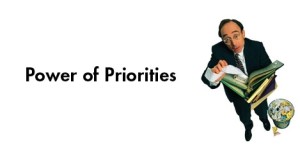Jun 4, 2014 | Planning & Goal Setting, Self

Is Time Management an oxymoron? Can you really manage time? Time marches on its own schedule, whether you like it or not, with or without you. You can’t manage time, but you can manage yourself, and what you do with your time. As your single most valuable resource, successfully leveraging time is critical to your success.
You can always make more money but you can’t make more time.
As you look at what you do with your most precious commodity, it only makes sense to start with the end in mind. Why is that important? Simply put – if you do not have a clear vision or goals in life or in business – then time management really becomes pointless. In other words, if you don’t know where you’re going any road will get you there, and what you do with your time doesn’t matter.
I did a seminar for NAWBO yesterday on TimeWise – how to properly invest your time, and it reminded me of how extremely valuable it is to master getting the best results from the investment of your time. There are tremendous tools and techniques for mastering it that most people don’t know about, or don’t use. So I’ve decided to do a series on the subject, this is part 1.
STEP ONE: DESTINATION – Where are you going?
A key element to develop effective time management is Vision. I know many people (and I’m sure you do as well) that waste so much precious time because they have little sense of purpose and vision. Therefore, they are doomed to live life, day to day, getting pulled this way and that, taking what comes and missing the possibilities that exist. Clarity is the most important concept when it comes to vision and personal productivity. The key reason why some people achieve more in a day than others (all things being equal) is due to the fact that they have complete clarity on their goals and objectives and don’t deviate from them. The discipline of clarity prevents procrastination and provides the focus and motivation that propels individuals to reach their dreams.
Let’s define vision. Vision can be described as your ideal state (for your life, business, career, etc.) in 1, 5, 10, 20 years and beyond. You should be able to picture this vision with absolute clarity and describe it with precise detail. The more clarity you have with your vision, the more motivation and focus you will have in your life. Commit to spending 2 hours developing and writing down, or drawing, your vision.
Having this clear vision will help you determine what you must do today in order to achieve what you want tomorrow. Once you have established a clear vision, it’s imperative to develop the goals that will help you achieve that vision. While vision is the destination, goals are the short and long-term milestones along the path that get you closer and closer to achieving your ultimate vision.
Do you have written goals for your life and your business? Next week I will talk more about setting goals. For today, focus on Vision, and developing a mindset of control over how you invest your time. You are responsible for how you choose to use your time. Its not anyone else’s fault, if you allow unimportant interruptions in your day, its your fault.
Developing the vision, and the right mindset and proper attitude sets the stage for creating effective time management habits and disciplines. Many of us feel chaos in our lives because we have not established the fundamental disciplines of time investment. You have to first believe your situation can change and that you have the power to overcome your ingrained habits. Once you have a firm desire and make the conscious decision to get control of your actions and behavior, you will then be open and prepared to learn and embrace the key disciplines and tools of effective time investment.
Where are you going?
Need help with setting vision or goals? Sign up for a free Business Health Check to get started.
May 6, 2014 | Planning & Goal Setting, Self

As a business owner, you’ll never have enough time to get to everything done. Since you can’t create more time, the real challenge lies in the ability to think ahead, and to have the discipline to do things in order of importance. Using the power of priorities makes the difference between a successful business and just surviving. And the same is true for all areas of our lives.
Leadership trainer and author John Maxwell says, “Thinking ahead and prioritizing responsibilities marks the major differences between a leader and a follower.”
Most people have heard of the Pareto Principle, more commonly known as the 80/20 Principle. Roughly stated, that in most businesses 80% of your business comes from 20 % of your customers.
Other examples of the Pareto Principle are:
Tasks 20 percent of your tasks will bring in 80 percent of your results.
Reading 20 percent of the book contains 80 percent of the content.
Job 20 percent of our work gives us 80 percent of our satisfaction.
Products 20 percent of the products bring in 80 percent of the profits.
So… when it comes to your priorities, 20 percent of your priorities will give you 80 percent of your production, IF you spend your time, energy, money and personnel on the top 20 percent of your priorities. When you do this you are getting a 400% or fourfold return in productivity. Think what this would mean in your business! That’s the power of priorities.
Every business person needs to understand the Pareto Principle as it applies to their personal productivity.
So if you have 10 tasks on your list (you do have them written down on a list right?), 2 of them will produce 5 to 10 times the value of the others. Interestingly, they probably all take roughly the same amount of time to complete. So doesn’t it make sense to find the 2, and focus on them first?
This is the area where most people fall down. You look at your list (you do have a written list right?) and you see 10 things. You see 2 that look easy and fast and you want to feel like you’ve accomplished something, so you say to yourself, OK, lets just bang those out and then I can focus on the harder activities. Hours later, you still haven’t gotten to those top priority projects, it’s now afternoon and your energy is waning, and you don’t have a large enough block of time left to do them, so you vow to tackle them first thing tomorrow. But hey, you cleared out all that clutter from your inbox! Lather, rinse, repeat.
As a business owner, you can decide whether you will be reactive or proactive when it comes to the use of your time. The question is not, “Will I be busy?” but “How will I invest my time?” It’s not “Will my calendar be full?,” but “What will fill my calendar?” Focus on your top 2 priorities that will deliver the highest value first thing in the morning, leave the administrivia for later in the day when you are more tired, and watch your productivity and personal satisfaction rise to new heights!
For more tools on prioritizing your day, go read Brian Tracy, “Eat That Frog“.
Feb 25, 2014 | Planning & Goal Setting

Many improvement books, seminars and articles have focused on why a 99% performance metric is not good enough. The statistics of what would occur if 99% WAS acceptable illustrate the reasons it isn’t good enough. Here are some commonly used statistics that stand out.
• 12 babies will be given to the wrong parents each DAY!
• 103,260 income tax returns will be processed incorrectly this year
• 880,000 credit cards will have incorrect information on the magnetic stripe.
• 20,000 incorrect drug prescriptions will be written in the next year.
We all get the point about the 99% performance metric, but it is a little overwhelming to think about getting to 99%, let alone hitting 100% perfection! Chances are we all have quite a bit of room between where we are now and perfection. When the gap is that daunting, it can easily lead to a feeling of “why bother?” Why don’t we take a moment to examine the other side of the improvement coin?
If we think instead about our current performance metric, and strive for an extra 1%, how does that look? Everyone can wrap his or her mind around getting 1% better, right? 1% more leads, 1% better customer service, 1% more accuracy,… Now that sounds manageable. If we can improve our selves, our business or some measurable metric just 1% a week, these are the corresponding results.
• 4.1% increase in a month
• 13.8% increase in a quarter
• 29.5% increase semi-annually
• 67.7% increase in a year
• 181.4% increase in 2 years
Would you like an increase in sales and profits of 67.7% over the next year? Heck yes! How about watching your commissions increase by 29.5% over the next 6 months? Would your children notice if you were more than twice the parent you were 2 years ago? Our spouses and significant others might be willing to consider a 13.8% increase in appreciation over the next quarter.
What can you do this week to improve just 1%? Pick the action and resolve to put a plan together to take it from inspiration to effective execution! Make 1% a habit every week and you’ll see amazing results! Need help?
Jan 20, 2014 | Planning & Goal Setting

Accept – you will never be able to do everything you want… because there is just too much to do.
Purpose – the driving force behind managing your time is to accomplish your ultimate goal/s.
FOUR SKILLS required to use your time wisely
Analysis, Planning, Delegation, Self management
THE PROCESS for success
- Determine what to do, what are the priorities that will move you most effectively towards your goals (you do have goals don’t you?) Or what things will have the most negative impact if you don’t do them?
- Focus on spending your time doing what is key to the success of your business.
- Work on tasks that can only be done effectively by you. (4 “D’s” — Do it…. Delegate it….Defer it….or Dump it)
- When to do – plan your week ahead, plan your tomorrow at the end of today
Organize your activities into the “urgency” vs. “importance” quadrants. Plan your time/ organize your work schedule so that you are never working the issues that fall into the two “Not Important” categories. (Read Stephen Covey if you’re not familiar with this matrix).
How to do (organize)
Create a “template” schedule for each time period – month/week/day – which allocates time periods for specific types of tasks. Ex: travel to customers, return/place phone calls; do quiet work, organize paperwork, read. Always work on your highest priority items first thing in the morning. Don’t fall into the inbox and find yourself still there 3 hours later.
Tool – Time blocking chart – map out your Important activities onto your calendar every day.
Follow your calendar – be disciplined.
The key to efficient use of time is planning. Always work from lists & mark the items for priority (a,b,c). Use weekly and daily lists.
PLANNING For Efficiency
Create your weekly or daily plan in advance — Friday night or weekend for next week; the night before, for the next day, rather than the morning of. Your brain will start working for you on the things you told it were important while you sleep. Gather any materials you’ll need to accomplish your tasks in advance, so can “hit the ground running”
For motivation
Put as much on your list as you can, momentum gained as you check off. Don’t fall into the trap of doing unimportant tasks just because they can be done quickly. That doesn’t make them a priority.
When large projects, break them into small steps so you can see progress.
For effectiveness
Each major project should be planned out over time periods – with other activities interspersed
HINTS for SUCCESS
Incremental progress is key. So for projects, “divide to multiply”. Start now, step by step.
Do the toughest things first, stops procrastination you’ll feel great… therefore…you’ll be inspired to do everything else required for the day
Delegate.
Include scheduled time in your plan to oversee/ train/ obtain & review reports on the work you have delegated. Do not slip into the habit of doing it.
If you schedule on importance not urgency –the urgent will almost never occur!
Aug 30, 2013 | Planning & Goal Setting
In his book, “What They Don’t Teach You at Harvard Business School,” Mark McCormak made an interesting discovery about the 1979 graduating MBA class. Within the group, 3% had written goals, 13% had thought of some goals and the balance were just thrilled to be out of school (I am sure you remember those feelings).
The interesting part was what happened ten years later.
Here are the results of their success after a decade:
The group that had non-written goals were making TWICE in the field compared to the 84% of those who had no goals leaving Harvard.
The group with written goals was making TEN TIMES what the other 97% were making on average.
I think you would agree that the folks at Harvard have a long history of knowing what they are doing. So if the top 3% were able to make TEN TIMES the money as everyone else by simply writing out their goals, why aren’t you doing it?
We are already through the hardest part of the ‘recession’ and yet people and businesses are still worried that our economic situation is dire. Resolutions made back at the beginning of the year, to get in better shape, to be a better golfer, to give more to charity, to be the best parent or spouse or partner that you could be may be starting to fade if they haven’t already. But who says making and keeping resolutions is just for the beginning of a year. Why wait?
Make sure that one of the resolutions you set and keep right now is to make a strong plan for yourself and your business; ones with enough detail that you can actually make progress against them on a consistent basis.
Write down ALL your goals you have for the next year. Then, find someone to share them with and have them check up on you monthly (quarterly at a minimum) to see if you are making progress. Have them hold you accountable with winnings and loosing for completion.
ActionTIP: Make milestones and chip away at each goal a little everyday so the overall picture doesn’t seem so overwhelming.
If you do this, then it won’t be long before you are making TEN TIMES more than your competition.




